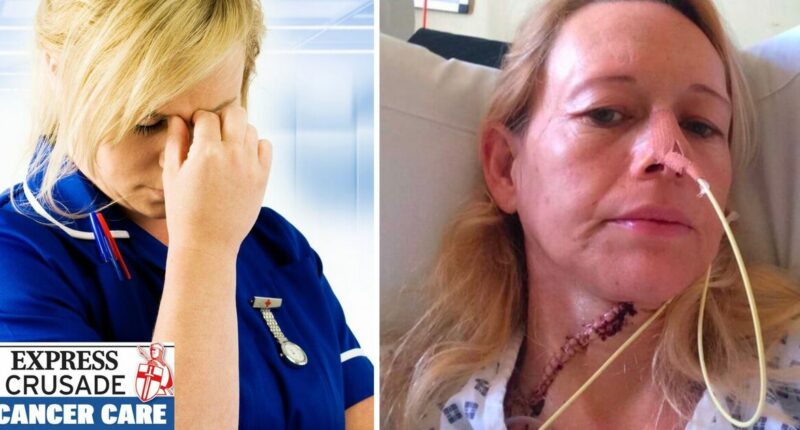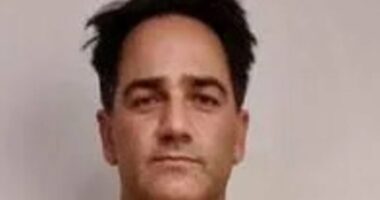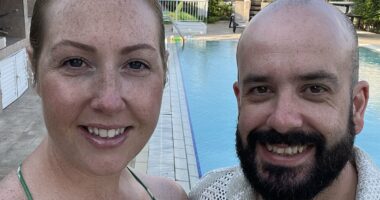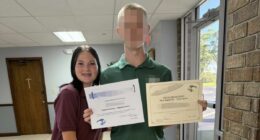Share this @internewscast.com
At the age of 43, an unexpected diagnosis turned my world and that of my family upside down. Tongue cancer was something I barely knew existed; there were no warnings, no posters, no advertisements alerting me to its presence. As a dedicated runner who paid close attention to my diet, I rarely indulged in alcohol and had never smoked. I merely thought of the persistent ulcer in my mouth as a minor nuisance, something I was accustomed to dealing with. However, after enduring the pain for six long months, I finally secured an appointment due to a last-minute cancellation, since my referral had not yet been processed.
Undergoing a biopsy was an ordeal in itself, leaving me anxiously awaiting the results. When my husband and I went to hear them, neither of us was prepared for the devastating words: “I’m sorry, my dear, but you have tongue cancer.” The shock was overwhelming. Given a brief 20 minutes in a separate room to process the news, I was overcome with emotion, struggling to grasp the reality of the situation.
Our journey continued as we were led to another section of the hospital to meet the medical team. Over the course of several hours, we learned not only about my diagnosis but also about the impending, transformative surgery. The plan was to remove a portion of my tongue and possibly reconstruct it using a skin graft from my non-dominant wrist.
Additionally, I was informed that I might need a tracheostomy during my hospital stay. The prospect of relearning how to speak, eat, drink, and swallow was daunting, to say the least.
Initially, I found myself in denial, quickly followed by a sense of shame. Medical professionals repeatedly advised me to quit smoking, despite the fact that I had never smoked a day in my life. It was frustrating to feel pigeonholed by stereotypes.
Throughout this challenging ordeal, my clinical nurse specialist and dietitian became my pillars of support. Their guidance and companionship were invaluable, keeping me grounded and helping me maintain my sanity amidst the chaos.
I had my surgery a month after my diagnosis, and this was nine years ago. I had the side of my tongue removed, and my surgeon decided I could “make do” without having my tongue rebuilt.
I also had a neck dissection, so my “war wounds” were very visible. I also had radiotherapy, which involved having a full-face mask made and a PEG feeding tube fitted into my tummy for when I struggled to eat, drink or swallow during treatment.
We often hear about the Holistic Needs Assessment, don’t we? How many times should a patient fill this out?
I filled it out once, and this was before radiotherapy started. After an awful experience at work where I was forced to give a verbal presentation to save my job, my mental health took a huge knock, and my clinical nurse specialist arranged for me to see a speech therapist, to not only help with my speech impairment, but also my lack of self-esteem and confidence.
I was told at the end of my treatment by the visiting speech therapist that I could manage without speech therapy.
My personal belief on this is that all head and neck cancer patients should be allowed to have not only speech therapy but also psychological support, as this cancer pathway is brutal.
Truly brutal. Not only did I look different with my visual scarring, but I sounded very different and at times am not clear at all with my speech.
Through my journey, and the patients and family members I support as a patient ambassador for the Mouth Cancer Foundation, I know I am not alone in my mental health struggles.
We must all contend with how we now look and sound. Many of us are no longer able to enjoy and eat the same foods we used to, as this changes due to the changed anatomy of our mouths and the effects of treatment.
Only 50% of head and neck cancer patients can return to their jobs. I persevered with my career in education for eight years post-cancer surgery and treatment, but I admitted defeat last year due to all the late effects I suffer with, with no support.
This is why I started campaigning for more late effects clinics for head and neck cancer patients, with the hope that mental health is finally addressed, along with the 60-plus late effects that many of us are left suffering with.
Holistic Needs Assessments need to be carried out once a year for patients, as patients can suffer long after their treatments finish, no matter what cancer they have had.
It is all very well filling out these forms, but the issues need to be addressed as well. We need the treatment path to be about diagnosis, surgery, treatment and late effects, as we all deserve a quality of life that is lacking afterwards.
This is why I’m backing the Daily Express’s Cancer Care campaign, to ensure all cancer patients get mental health support both during and after treatment.












